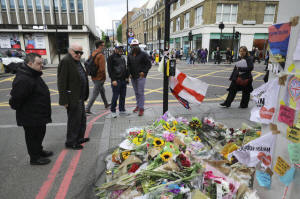|
London Bridge attackers had tried to hire
8.3 ton truck: police
 Send a link to a friend
Send a link to a friend
 [June 10, 2017]
By Michael Holden [June 10, 2017]
By Michael Holden
LONDON (Reuters) - The three Islamists who
killed eight people after driving a van into pedestrians on London
Bridge and then attacking nearby revelers had initially tried to hire a
7.5 tonne (8.3 ton) truck, the head of the UK capital's
counter-terrorism unit said on Friday.
Commander Dean Haydon also revealed that the men had a stockpile of
petrol bombs in the back of their van and carried out their deadly
attack with pink ceramic knives. Officers also discovered a Koran in
their safe house, opened at a page on martyrdom.
The discoveries, especially of the plan to hire a truck, suggested more
could have been killed.
"Getting hold of a 7.5 tonne lorry - the effects could have been even
worse," Haydon told reporters.
Although Islamic State militants have claimed responsibility for the
attack, Haydon said there was no evidence the attackers - Pakistani-born
Briton Khuram Butt, Italian Youssef Zaghba and Rachid Redouane who had
links to Libya, Morocco and Ireland - were directed by anyone else,
either in Britain or abroad.
"We're not looking for a wider network," said Haydon, head of London's
Counter Terrorism Command, adding that officers were still trying to
piece together how the three men had met. "How did they know each other?
They are a diverse bunch," he said.
Haydon provided unusually extensive details of last Saturday's attack,
the deadliest in London since suicide bombers killed 52 people on the
city's transport network in 2005.

RINGLEADER
On Saturday morning, Butt, who Haydon said was believed to be the
ringleader, tried to rent a 7.5 tonne truck but did not provided payment
details.
It was not clear why he could not pay, or if he lacked the necessary
license to drive such a vehicle. But his attempt echoed last July's
attack in Nice, France, when a 19-tonne truck was driven into crowds,
killing 86 people.
Shortly before 1700 GMT, Butt received a text message confirming his
hire of a Renault van instead.
At about 1730 GMT, the men drove to pick up the van before heading to
Zaghba's home in east London. At 1838 GMT they left and two hours later
the van reached London Bridge which they drove along twice before
targeting pedestrians on the sidewalk on their third run.
Three people on the bridge were struck and killed by the van, believed
to have been driven by Butt, before the men abandoned the vehicle and
began to attack people in bars and restaurants in the nearby bustling
Borough Market area.
The men were armed with identical 12-inch (30cm) pink ceramic knives,
strapped to their wrists with leather bound around the handle. They were
also wearing fake suicide belts - plastic water bottles wrapped in duct
tape.
Eight minutes after police were alerted, armed officers arrived at the
scene and fired 46 rounds, killing all three men. Their victims were
three French nationals, two Australians, a Canadian, a Spaniard and a
Briton.
In the attackers' van detectives found 13 wine bottles, filled with
lighter fuel with rags wrapped round them to make Molotov cocktail
petrol bombs. There were also two blow torches which Haydon thought
could have been used to light the homemade bombs as part of a possible
secondary attack.

[to top of second column] |

People look at floral tributes near London Bridge, London, Britain,
June 8, 2017. REUTERS/Marko Djurica

"They were still fairly close to the van. There is a possibility
that they could have come back," Haydon said.
There were also office chairs, a suitcase and two bags of gravel
which Haydon said might have been to add weight or to act as a cover
story for their activities to friends and family.
He said Redouane's home, an apartment in Barking, east London, was
the men's safe house where they put their plot together and prepared
the attack.
There they found an English-language copy of the Koran which had
been left open on a page describing martyrdom, along with other
items linked to their attack.
Haydon said since last Saturday they had taken 262 statements from
people from 19 different countries and numerous international
inquiries were ongoing relating to the attackers and the victims.
CRITICISM
British police and security services were criticized after it
emerged that they had known about Butt, who featured in a TV
documentary entitled "Jihadis Next Door", in which he joined a group
unfurling an Islamic State (IS) flag in a park.
Haydon acknowledged that Butt had links to al Muhajiroun, a banned
group headed by cleric Anjem Choudary. He was jailed last year for
encouraging support of IS, which has been linked to numerous
militant plots in Britain and abroad.
Butt was also arrested for fraud last October but was about to be
told by prosecutors he would face no further action.
"We will be looking at intelligence and our processes, and asking
ourselves the question: 'Could we have prevented such an attack?',"
Haydon said. "There is nothing that I'm seeing at the moment that
suggested that we got that wrong."
Police have installed security barriers running alongside the
sidewalks at eight bridges across the River Thames, and Haydon said
similar protection was being considered at other locations.

Police were also reviewing security at "iconic sites", crowded
places and major events, and refreshing advice to theaters, bars,
shopping centers and sports venues.
(Editing by Jon Boyle)
[© 2017 Thomson Reuters. All rights
reserved.]
Copyright 2017 Reuters. All rights reserved. This material may not be published,
broadcast, rewritten or redistributed. |